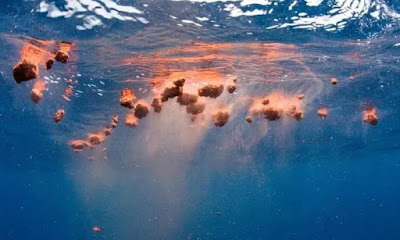Going to the beach to swim, dive, surf, and wander happily is a summer wish of many people...
However, have you ever thought about a question:
The ocean is not only the home of thousands of marine life but also their communal toilet...
Every day, marine organisms find food and excrete in the same place, which sounds uncomfortable, but for individual marine organisms, excrement can also be the most nutritious resource for reuse, which is continuously consumed and recycled. Maintaining the balance of the marine ecosystem also plays an essential role in establishing the food chain.
Yes, the protagonist of our story, today is the most significant contributor to the ocean "toilet."01 Why whale poop, pink and tender
Let me talk about a cold knowledge: whale poop is pink!
A behemoth under the sea like a whale, whose excrement is so "girly"? What principle?
 |
| Groups of krill |
The main food of whales
is krill. You know, whales eat krill in tons, and they can swallow two tons in
one bite! But the whale only absorbs the fat part of the krill, and the iron
contained in the krill will be excreted by the whale along with its stool.
Because it contains a lot of iron ions, it causes whale poop to look pink.
02
The engine of the marine ecosystem
Of course, in addition to looking at the tenderness, whale poop is also very useful-it is the key to good circulation in the ocean system.
In 2010, a team led by Steve Nicol, a scientist at the Australian Antarctic Research Centre analyzed 27 poop samples of four types of baleen whales and found that cetacean poop had a higher iron content than seawater near Antarctica Out of 10 million times.
Iron is an essential nutrient for all organisms.
Marine phytoplankton must extract iron from seawater before they can grow.
Therefore, whale poop floating on the sea has become the favorite nutrient of
phytoplankton.
 |
| Marine phytoplankton |
Phytoplankton absorbs the stool of whales and then absorbs carbon dioxide to release oxygen through photosynthesis.
A study published in Science Express in 2012 showed that tiny organisms might have a significant impact on climate change. Researchers at Michigan State University in the United States believe that although plankton is small, they are active in the oceans and consume about half of the carbon dioxide emitted into the atmosphere.
Nick said: "The phytoplankton likes whale feces, a natural fertilizer, which makes them absorb more carbon dioxide than usual."
 |
| The poop of a whale |
The phytoplankton on the seafloor has become a constant source of food for krill, supporting krill's proliferation and continuing to provide the next gluttonous meal for whales.
In this cycle, carbon dioxide is continuously absorbed, and oxygen is continuously released, forming a virtuous ecological cycle.
03 A whale falls, everything grows
In addition to poop, whales themselves are experts in curbing global warming.
Whales will absorb a large amount of carbon dioxide when they eat, and along with the whale's long life course, these gases will remain in the whale's body for decades or even hundreds of years.
It can be said that the whale is a giant mobile carbon dioxide warehouse.
 |
| Whale carbon and oxygen flux |
According to estimates by the International Monetary Fund, each whale can store an average of 33 tons of carbon dioxide.
What is the concept of 33 tons of carbon dioxide?
A tree absorbs 22 kilograms of carbon dioxide each
year, and it can store 2.2 tons in 100 years. In other words, the amount of
carbon dioxide absorbed by a whale is equivalent to the total amount absorbed
by 1,500 trees in a year.
At the same time, when the whale dies and sinks to the bottom of the sea, it will form a natural whale fall to feed the ocean and provide a large amount of direct food for scavengers and bacteria in the deep sea.
The deep-sea
microorganisms supplied with nutrients by the "whales" will return to
the surface of the sea while the living whales are swimming, promote the growth
of phytoplankton, and start a new cycle. When a whale falls, all things live,
forming a complete ecosystem.
Compared to the terrestrial trees that we are more familiar with, whales are more like unsung heroes in the deep sea against global warming. Therefore, protecting and expanding whale populations is also a meaningful way to enhance the earth's carbon capture capacity, and its impact on mitigating climate change may be no less than afforestation.
In
2019, the International Monetary Fund (IMF) estimated that whales are worth
more than US$1 trillion in carbon sequestration and maintaining ocean
functional health! Unfortunately, in the past two centuries, the number of
whales in the global ocean have fallen from 5 million to 1.5 million today.
 |
| Humpback whale rescued by humans (photo: documentary "Whale's Odd Journey") |
Although commercial whaling has long been banned, the living environment of whales is still harsh: ocean pollution, plastic pollution, ocean changes caused by climate change, and so on.
Finally, I do hereby request to everyone to protect whales, reduce plastic pollution, put an
end to illegal fishing, and allow them to land naturally. Let this beautiful
cycle continue.
Related articles :
More readings :
References :
People's Daily Online: Research says whale dung is one of the magic to save Antarctic waters.
[Natural Science] Public Article: The air you breathe smells of whale shit in every bite.



2 comments
Click here for commentsNice article keep it up.. Cheers 👍
Replygood job..👍👍
ReplyConversionConversion EmoticonEmoticon